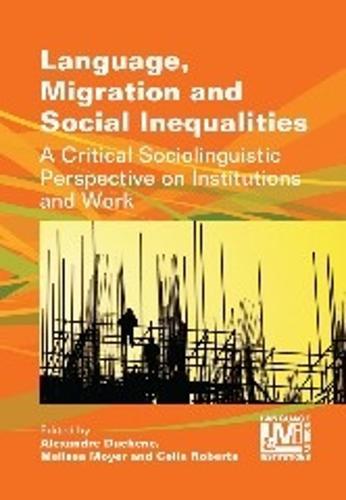Overview
Migration and the mobility of citizens around the globe pose important challenges to the linguistic and cultural homogeneity that nation-states rely on for defining their physical boundaries and identity, as well as the rights and obligations of their citizens. A new social order resulting from neoliberal economic practices, globalisation and outsourcing also challenges traditional ways the nation-state has organized its control over the people who have typically travelled to a new country looking for work or better life chances. This collection provides an account of the ways language addresses core questions concerning power and the place of migrants in various institutional and workplace settings. It brings together contributions from a range of geographical settings to understand better how linguistic inequality is (re)produced in this new economic order.
Full Product Details
Author: Alexandre Duchêne ,
Melissa Moyer Greer ,
Celia Roberts
Publisher: Channel View Publications Ltd
Imprint: Multilingual Matters
Volume: 2
Dimensions:
Width: 14.80cm
, Height: 2.10cm
, Length: 21.00cm
Weight: 0.498kg
ISBN: 9781783091003
ISBN 10: 1783091002
Pages: 296
Publication Date: 12 November 2013
Audience:
Professional and scholarly
,
Professional & Vocational
Format: Hardback
Publisher's Status: Active
Availability: In Print

This item will be ordered in for you from one of our suppliers. Upon receipt, we will promptly dispatch it out to you. For in store availability, please contact us.
Reviews
This stimulating volume brings together classic strands of critical sociolinguistic work on how immigrants are disadvantaged in social gatekeeping institutions and the contemporary sociolinguistics of globalization. Taking a broad view of 'migrants' as sociolinguistically mobile citizens, the authors mobilize an impressive array of ideological, political and economic frameworks to explore the continuing power of institutions to confer and withhold status and opportunity as well as forms of resistance to these processes. -- Alexandra Jaffe, California State University, Long Beach, USA This major sociolinguistic contribution, with its wide-ranging and detailed ethnographic attention to the structures shaping migrant experiences of language, sheds innovative analytic light on the neoliberal regimentation of language at work, in school, and in bureaucratic processes, the commodification of language skills, and the contradictions of contemporary capitalism that shape linguistic practices and ideologies. -- Bonnie Urciuoli, Hamilton College, USA This book does a wonderful job of focusing critically on the sociolinguistics of migrant workers - the protagonists of the book - in various institutions and workplaces (or their exclusion from them). From the informal locutorios of Barcelona and Congolese la debrouille in Cape Town, to the decapitalisation of migrant students in Madrid schools and the mismatched aspirations and actual work of Japanese flight attendants, these studies focus both on local migrant sociolinguistics as well as wider social and economic orders. Making questions of the (re)production of linguistic, social and economic disparities central, this book thus provides vital insights into language, mobility and inequality. -- Alastair Pennycook, University of Technology, Sydney, Australia
This stimulating volume brings together classic strands of critical sociolinguistic work on how immigrants are disadvantaged in social gatekeeping institutions and the contemporary sociolinguistics of globalization. Taking a broad view of 'migrants' as sociolinguistically mobile citizens, the authors mobilize an impressive array of ideological, political and economic frameworks to explore the continuing power of institutions to confer and withhold status and opportunity as well as forms of resistance to these processes. Alexandra Jaffe, California State University, Long Beach, USA This major sociolinguistic contribution, with its wide-ranging and detailed ethnographic attention to the structures shaping migrant experiences of language, sheds innovative analytic light on the neoliberal regimentation of language at work, in school, and in bureaucratic processes, the commodification of language skills, and the contradictions of contemporary capitalism that shape linguistic practices and ideologies. Bonnie Urciuoli, Hamilton College, USA This book does a wonderful job of focusing critically on the sociolinguistics of migrant workers - the protagonists of the book - in various institutions and workplaces (or their exclusion from them). From the informal locutorios of Barcelona and Congolese la debrouille in Cape Town, to the decapitalisation of migrant students in Madrid schools and the mismatched aspirations and actual work of Japanese flight attendants, these studies focus both on local migrant sociolinguistics as well as wider social and economic orders. Making questions of the (re)production of linguistic, social and economic disparities central, thisbook thus provides vital insights into language, mobility and inequality. Alastair Pennycook, University of Technology, Sydney, Australia
Author Information
Alexandre Duchene is Professor of Sociolinguistics at the University of Fribourg and Director of the Institute of Multilingualism of the University and HEP Fribourg (Switzerland). Recent publications include Ideologies across Nations (2008), Discourses of Endangerment (with Monica Heller, 2007) and Language in Late Capitalism: Pride and Profit (with Monica Heller, 2011). Melissa Moyer is Professor of English Linguistics at the Universitat Autonoma de Barcelona, Spain, where she leads the C.I.E.N. Research Team. Her current research is concerned with multilingualism and mobility in connection to linguistic practices and the construction of identity. She was editor of The Blackwell Guide to Research Methods in Bilingualism and Multilingualism (2008, with Li Wei). Celia Roberts is Professor of Applied Linguistics at King's College London, UK in the Centre for Language, Discourse and Communication. Her publications include Talk, Work and Institutional Order (1999, with Srikant Sarangi). Her main interest is in the practical relevance and application of sociolinguistics to real world problems.




